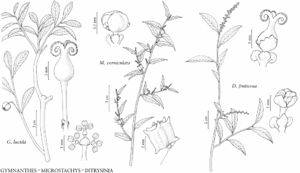Gymnanthes lucida
Prodr., 96. 1788.
Shrubs or trees, 1–10 m, latex watery. Leaves: stipules persistent, lanceolate, 1 mm, glands present; petiole 0.2–1.5 cm; blade oblanceolate, 3.5–10 × 1.5–4 cm, base cuneate, margins obscurely gland-toothed, apex acute to obtuse; laminar glands usually 2 near base, elliptic; venation prominent on both surfaces. Inflorescences 3–3.5 cm, peduncle 0–0.5 cm; staminate cymules numerous, each usually with 3 flowers per bract, cymule axis 0.2–1.3 mm, bracts reniform, cucullate, 1 mm wide; pistillate flowers usually 1 per inflorescence. Pedicels: staminate 0.3–2 mm, usually bearing scalelike bracteole at summit; pistillate to 10 mm, to 30–40 mm in fruit, bearing 1–5 scalelike bracteoles. Staminate flowers yellowish green; filaments connate 0.3 mm, distally distinct 0.2–0.4 mm; anthers 0.4–0.5 mm. Pistillate flowers yellowish green; styles 2–3 mm, connate 1/2 length, distally recurved. Capsules subglobose, trigonous, 0.8–-1 cm diam.; styles persistent. Seeds 4–4.5 × 4 mm; seed-coat brown, smooth; caruncle discoid, 1.5–2 mm diam.
Phenology: Flowering spring–summer (Apr–Jun); fruiting summer–fall (Jul–Oct).
Habitat: Subtropical moist hardwood hammocks.
Elevation: 0–10 m.
Distribution
Subtropical moist hardwood hammocks, Fla., Mexico, West Indies, Central America
Discussion
The young inflorescences of Gymnanthes lucida are formed during the prior growing season and resemble small cones due to the tightly appressed bracts; they expand rapidly at the end of the dry season. The scalelike structures subtending individual staminate and pistillate flowers are here referred to as bracteoles (P. B. Tomlinson 1980) but have also been interpreted as vestiges of sepals (G. L. Webster 1967).
Gymnanthes lucida is known in the flora area from Miami-Dade and Monroe counties.
Selected References
None.
Lower Taxa
"connate" is not a number. "distinct" is not a number."/2" is not declared as a valid unit of measurement for this property.
